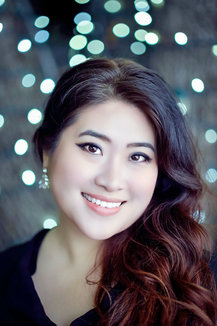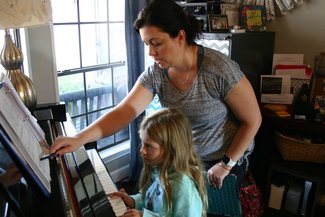|
-Meredith Manley A natural part of learning any instrument is experiencing what we as teachers call “slumps”- a brief period of time where a student goes through a difficult patch or has lost motivation for whatever reason. It’s during these times where it’s tempting for the student to give up on lessons altogether, so encouragement and support from parents is absolutely necessary. One of the most difficult slumps to tackle is the first one, which usually happens when a student is starting to read on the staff and is no longer playing just steps. They are learning to recognize different intervals, incorporating more expressive notation, and may be playing more hands together. I’ve seen many students cruise through the first few months of piano lessons without having to put in a lot of effort, and then all of a sudden it’s no longer fun and exciting because they have to work harder. So how do we conquer this first slump? A lot of it has to do with the expectations we set. As a beginner, it’s important for the teachers and parents to explain that there will be times where learning the instrument is challenging, and that it will happen during the course of their study. If there is no conversation about this, then the student doesn’t know that everyone experiences these rough patches and he/she may lose self-esteem. I usually hear, “This is too hard for me”, “I’m not doing anything right”, or “I’m not good at piano anymore” in the lesson, which signals that the student has lost confidence. If students know ahead of time that these slumps are expected to happen, they can acknowledge that what’s going on is normal and temporary. Besides setting expectations, another way to keep moving forward is to actually take a couple of steps back. Reviewing old pieces that the student has mastered is a great way to rebuild confidence. Showing them a piece they were working on 4-5 months ago compared to what they are learning now is a great reminder of how much progress they’ve made. Often times they are only thinking of what they can’t do in their current pieces and have forgotten how far they’ve come. The important thing is no matter what, don’t let your child quit! Learning an instrument is a great way for children to learn persistence and work ethic. Are surgeons born knowing how to perform surgery? Do pilots immediately know how to fly an airplane? No! It requires practice, patience, and experience, just like learning an instrument. Sticking with it through the slumps will not only develop a lifelong hobby, but they will have also developed the characteristics to succeed as adults.
0 Comments
 Q: Tell us about how you first became involved in music A: I began to take piano lessons when I was 6. I have been in love with music ever since. Q: Is anyone else in your family a musician? A: No. But they are all great music enthusiasts! Q: Growing up, did you have any influential teachers/professors who guided you towards becoming a professional musician? A: I have so many professors and teachers who guided me. But it would not be possible without my mom, who encouraged me to take piano lessons and supported my musical journey ever since. Q: What is your personal teaching philosophy? A: I believe every student is highly individual. I tailor my lesson plans according to the students’ specific needs. Q: You are currently working towards your doctorate degree at UNT- what has been the best thing you’ve learned during your studies there? A: My DMA studies at UNT has been one of the best experiences of my life. My overall understanding in music and pedagogy has been deepened and widely influenced by the professors there. Q: You have done several opera performances around the world- who has been your favorite character to portray and why? A: I had a tremendous honor of portraying the role of Susan B. Anthony in the opera The Mother of Us All by Virgil Thomson. She is a wonderful role model for all women. Q: Besides opera, what other genres or styles do you enjoy singing? A: I love musical theater songs. I love singing hymns at church every Sunday too. Q: What is your favorite part about being a voice/piano teacher? A: I love that I have become an advocate of music for young students. It is a tremendous privilege that comes with great responsibility. Q: When you are not teaching, what do you like to do in your spare time? A: Watch a movie with my husband and relax for the day. To see more about Youna, see her teacher page. -Becky Corley, guest blog with over 40 years of teaching experience. Becky is an amazing mentor to Stathia and taught her so much about teaching piano and running a music studio. A few words about Achievement Auditions. Every spring we send our students (usually students third year and above) to perform. Students play three pieces of contrasting style: a Baroque piece, a Sonatina, and a solo of their choice. They are judged with a written critique for each piece and given an overall rating. Based on their rating, students earn points toward trophies. These Achievement Auditions are the culmination of the piano year for early intermediate and advanced students. Most students have experience preparing ONE piece for performance, but many have never before prepared THREE pieces for performance at the same time. I’d like to offer some practice hints for preparing for this big event – and some things you can do at home to help out. Ideally, pieces should be securely memorized three weeks before performance. Auditions are scheduled for April 22; that means all pieces should be memorized by the beginning of April. That’s pretty soon! Work in small parts for memory. Don’t rely on finger memory only – use your brain, too! If all three pieces are not memorized by the deadline, it’s not the end of the world. That’s a GOAL date. The sooner you have the pieces memorized, the more time you have to polish them and let the music become a part of you.
Make sure you have marked practice parts with your teacher. This will help in practicing and help in having a starting place in the unlikely event of a little memory slip. After you’ve got the memory down, go BACK to playing with the music – that’s sort of crazy! But now you’ll alternate between playing with music and playing by memory. Pay attention to every detail of the music. You also need to alternate between playing at a very slow tempo, at a medium tempo, and at performance tempo. At first, you might not have the tempo as fast as you want it for a final performance, but you’ll get there. This is where the metronome can really be your friend. With your teacher’s help, set different tempos to practice with. This will be a great tool for you! Arrange to have opportunities for playing your three pieces for other people – your friends, your mom and dad, your grandparents, your music class at school. These practice performances will help make you more comfortable playing your pieces for others. Parents, sit down at least twice a week during the three weeks before Auditions. Thoughtfully listen to your child’s performance and offer comments about what you liked about their playing. Be encouraging at all times. REMEMBER THAT EVERY STUDENT’S SUCCESS PROBABLY DEPENDS MORE ON PRACTICE THAN ON ANY OTHER SINGLE FACTOR. From now on, it is vital that students practice at their scheduled time (not catch-as-catch-can) and that their mind is actively engaged. |
Archives
July 2024
Categories
All
|
|
|
MUSIC SO SIMPLE
|



 RSS Feed
RSS Feed